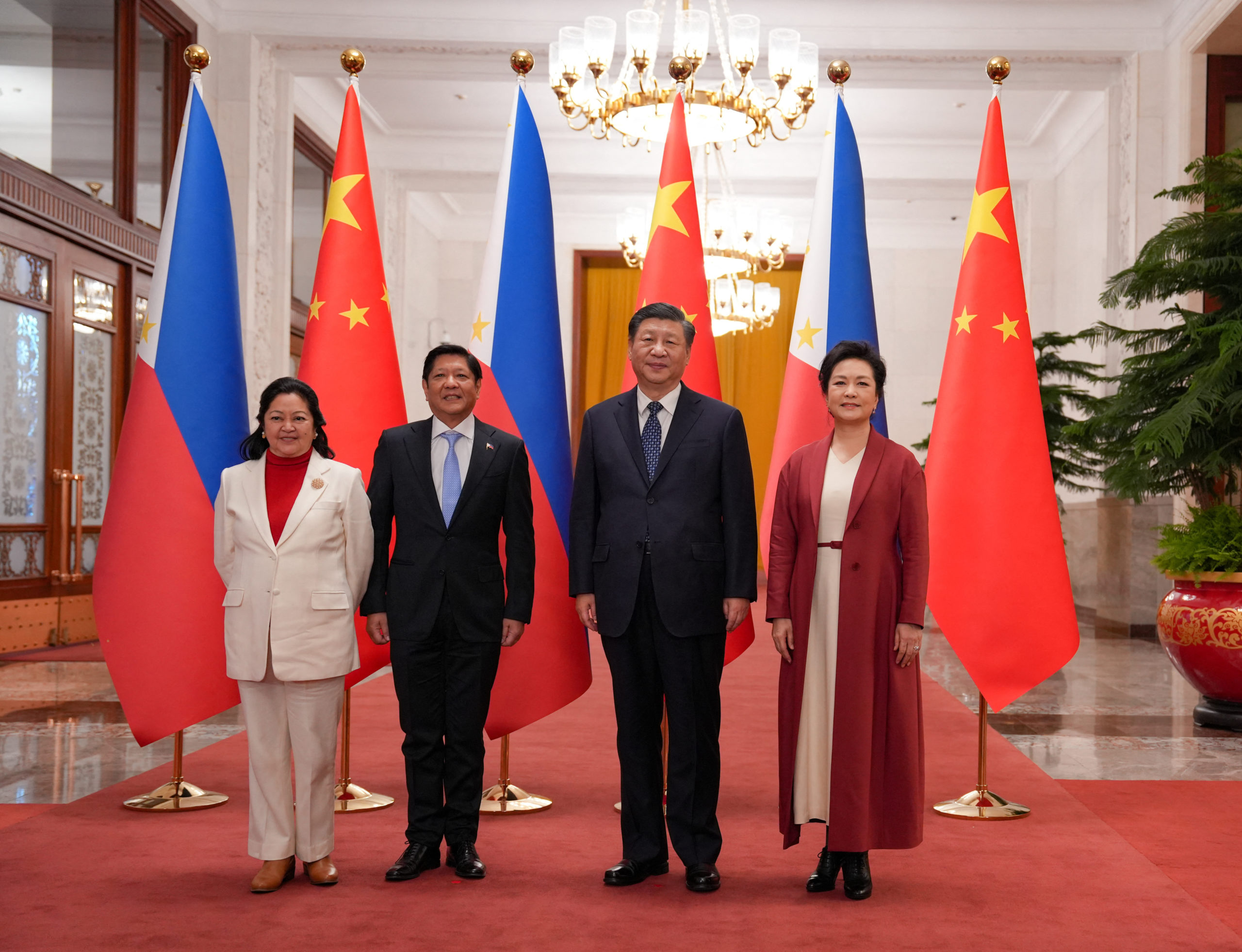
Philippines’ President Ferdinand “Bongbong” Marcos Jr. and First Lady Liza Araneta Marcos are photographed with China President Xi Jinping and his wife Peng Li Yuan during a welcoming ceremony at the Great Hall of the People in Beijing, China, January 4, 2023. Office of the Press Secretary/Handout via REUTERS
MANILA, Philippines – The Philippines and China signed 14 bilateral agreements during the state visit of President Ferdinand Marcos Jr., said Malacañang.
The Presidential Communications Office (PCO), in a statement on Wednesday, said the scope of the deals run across agriculture, infrastructure, development cooperation, maritime security and tourism, among others.
Below is a rundown of the 14 bilateral agreements and what we know about them:
On maritime row
A direct communication mechanism, established between the Maritime and Ocean Affairs Office of the Department of Foreign Affairs (DFA) and the Department of Boundary and Ocean Affairs of China’s Ministry of Foreign Affairs, seeks to prevent possible miscommunication between both countries on issues concerning the West Philippines Sea.
“President Marcos and President Xi concurred that ‘confidence-building measures would contribute to improving mutual trust’ and reaffirmed the importance of the Foreign Ministry and Consultations and the Bilateral Consultation Mechanism on the West Philippine Sea,” the PCO said in a statement.
Xi and Marcos, according to the PCO, also “reaffirmed the importance of the Declaration on the Conduct of Parties in the South China Sea in safeguarding peace and stability in the West Philippine Sea.”
The DOC, signed by China and member states of the Association of Southeast Asian Nations in 2002, calls for all parties to exercise self-restraint from conducting activities that may disrupt the peace and order in the region.
In a media interview in Beijing, Marcos said he himself proposed this agreement to avoid heightening tension in the West Philippine Sea.
The Philippines has a long standing dispute with China, who has made sweeping claims in nearly all of the South China Sea, including parts of the West Philippine Sea, along with its potential offshore oil and gas deposits and traditional fishing grounds.
READ: Manila, Beijing to set up ‘hotline’ on maritime row
Exporting durian
Marcos said the protocol on phytosanitary requirements for the export of fresh durian from the Philippines to China, finalized by the Department of Agriculture (DA) and China’s General Administration of Customs, signifies that the market for fresh durians is “now open to Philippine exporters and Chinese importers.”
China is among the biggest markets for the pungent-smelling fruit.
According to Marcos, the country’s durian growers have “long waited” for the green light to export durian to Chinese markets.
READ: Marcos: PH durian market in China ‘now open’
Bilateral tourism
The Philippines and China sealed a memorandum of agreement on the Implementation Program on Cooperation to push for bilateral tourism between both countries.
It was signed by Tourism Secretary Christina Frasco and China’s Culture and Tourism Minister Hu Heping.
In a statement, Frasco said this deal will “generate massive employment opportunities and investments across all sectors of tourism throughout the Philippines.”
“Our governments will work together on increasing tourist arrivals, resuming and adding direct flights to key and emerging destinations, joint promotional activities, and inviting tourism investments in infrastructure, among others,” she added.
READ: China, PH inks tourism cooperation deal
Other PH, China deals
The PCO had listed the rest of the bilateral agreements signed by both countries during Marcos’ three-day state visit to China.
It, however, has yet to further flesh out the details about each of them.
- For agriculture
-Joint action plan for 2023-2025 on agricultural and fisheries cooperation between the DA and China’s Ministry of Agriculture and Rural Affairs
-Handover certificate of the Philippine-Sino Center for Agricultural Technology-Technological Cooperation Phase III - For infrastructure
-Memorandum of Understanding (MOU) on cooperation on the Belt and Road Initiative
-Handover certificate of two China-aided projects in Manila: the Binondo-Intramuros bridge and the Estrella-Pantaleon bridge
-Framework for the Renminbi-portion of the loan financing three priority projects of the Department of Public Works and Highways (DPWH)
-Four loan agreements for the mixed credit financing (US Dollar and Renminbi) of three priority bridge projects under the DPWH - For trade and economy
-MOU on electronic commerce cooperation between the Department of Trade and Industry and China’s Ministry of Commerce
-Agreement on economic and technical cooperation between China and the Philippines
-MOU on the Development Cooperation Plan 2023-2025 between the National Economic and Development Authority and China’s International Development Cooperation Agency
-Mutual recognition agreement on the authorized economic operator program between the Bureau of Customs and China’s General Administration of Customs - For information and communications technology
-MOU on digital information and communications technology cooperation between the Department of Information and Communications Technology and China’s Ministry of Industry and Information Technology
Demand for full disclosure
Rep. France Castro of the Alliance of Concerned Teachers has called on the government to make the details of these transactions available to the public so Filipinos can thoroughly scrutinize them.
She also cited a provision in the 1987 Constitution and a Constitutional Commission transcript, stating that loan agreements must be submitted to Congress before they are executed.
“We hope that the recently signed loan agreements with China would be forwarded to Congress for scrutiny,” the lawmaker added.
RELATED STORY:
Makabayan solon demands transparency in gov’t’s 14 deals with China

